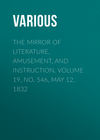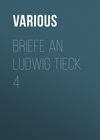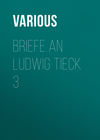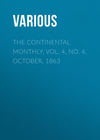Buch lesen: «The Mirror of Literature, Amusement, and Instruction. Volume 19, No. 546, May 12, 1832», Seite 2
FRENCH CRUELTY
During the late French Revolution, one of the royalist soldiers having his horse shot under him by a pupil of the Polytechnic School, and finding when thus brought down, that he could not regain his feet and resume a posture of defence, but was entirely at the mercy of his ferocious young adversary, he immediately surrendered his sword, exclaiming, "I am your prisoner, and entreat of you mercy and life." To which the generous and heroic youth replied, "No prisoners, no mercy!" and taking from his pocket a pike-head or some similar rough weapon, deliberately drove it into the unfortunate soldier's heart!
EFFRONTERY
A nobleman being, it is said, some years since, in the shop of a celebrated London shoemaker, saw, pass through it, a very handsome young woman, "Who is that fine girl?" said he.
"My daughter," replied the cord-wainer, "with sixty thousand pounds at your lordship's service."
A BLUNDER
Literary topics came under discussion one evening in a small social circle, of which the writer made one, and particularly the autobiographical works, and personal memoirs, now so much in vogue. A gentleman then stated, that having seen much of the world, he thought he must follow the fashion, and one day favour it with his own life and adventures. Numerous ladies were to figure in his book, which was, in fact, as he modestly gave the present company to understand, to be a complete chronicle of the flirtations and conquests of himself, and male allies, with letters, portraits, &c. and names in full. "But," remarked a lady, humouring the jest, "if you do render your book so very personal, are you not afraid of the consequences?"
"Not at all," replied the embryo author very gravely, "for though I shall enjoy the remarks of the world, upon my autobiography, they cannot affect me, as it will of course be a posthumous work."
COOL COURAGE
During the disastrous fire of the Kent East Indiaman, a lady on board exhibited a very singular instance of sang froid and presence of mind. Being in one of the cabins, with a large, helpless, despairing, and of course, most troublesome party, chiefly of her own sex, "all hands" of the other being "turned up," we presume, to check the advances of the devouring element, she proposed, by way of keeping them quiet, to make tea for them, and we believe her proposal was accepted, and had the desired effect.
Great Marlow, Bucks.
M.L.B.
ABSTRACT STUDIES
(For the Mirror.)
Demosthenes to be the more removed from noise, and less subject to distraction, caused a small chamber to be made under ground, in which he shut himself up sometimes for whole months, shaving half his head and only half his face, that he might not be in a condition to go abroad. It was there, by the light of a small lamp, he composed his admirable Orations, which were said by those who envied him, to smell of the oil, to imply that they were too elaborate. He rose very early, and used to say, that he was sorry when any workman was at his business before him. He copied Thucydides' history eight times with his own hand, in order to render the style of that great man familiar to him.
Adrian Turnebus, a French critic, was so indefatigable in his study, that it was said of him, as it was of Budaeus, that he spent some hours in study even on the day he was married.
Frederick Morel had so strong an attachment to study, that when he was informed of his wife's being at the point of death, he would not lay down his pen, till he had finished what he was upon, and when she was dead, as she was before they could prevail on him to stir, he was only heard to reply coldly, "I am very sorry, she was a good woman."
Sir Isaac Newton, when he had any mathematical problems or solutions in his mind, would never quit the subject on any account; dinner was often known to be three hours ready for him before he could be brought to table. His man often said, when he was getting up in the morning, and began to dress, he would, with one leg in his breeches, sit down again on the bed, and remain there for hours before he got his clothes on.
Mr. Abraham Sharp, the astronomer, through his love of study, was very irregular as to his meals, which he frequently took in the following manner: a little square hole, something like a window, made a communication between the room where he usually studied, and another chamber in the house, where a servant could enter, and before this hole he had contrived a sliding board, the servant always placing his victuals in the hole, without speaking a word or making the least noise, and when he had leisure he visited it to see what it contained, and to satisfy his hunger or thirst. But it often happened that the breakfast, the dinner, and the supper remained untouched by him, so deeply was he engaged in his calculations and solemn musings. At one time after his provisions had been neglected for a long season, his family became uneasy, and resolved to break in upon his retirement; he complained, but with great mildness, that they had disconcerted his thoughts in a chain of calculations which had cost him intense application for three days successively. On an old oak table, where for a long course of years he used to write, cavities might easily be perceived, worn by the perpetual rubbing of his arms and elbows.8
SWAINE.
THE SELECTOR; AND LITERARY NOTICES OF NEW WORKS
THE CONTRAST
The title of Lord Mulgrave's clever novel is sufficiently explained by the hero, Lord Castleton, a man of high refinement, marrying an unsophisticated, uneducated peasant girl. The scenes and incidents of her introduction into the fashionable world are replete with humour, yet true to the life. Thus, how naturally are her new Ladyship's embarrassments told:—
"There were some points on which she would even have endeavoured to extract knowledge from the servants; but dreading, from her former habits, nothing so much as too great a familiarity in this respect, Castleton had made it one of his first desires to her, that she would confine her communications with them, to asking for what she wanted. To this, as to every other desire of his, she yielded, as far as she could, implicit obedience; but it was often a great exertion on her part to do so. Of her own maid she had felt from the first a considerable awe; and to such a degree did this continue, that she could not conceive any fatigue from labour equal to the burthen of her assistance. Being naturally of a disposition both active and obliging, it was quite new to her to have any thing done for her which she could do for herself. For some time she had as great a horror of touching a bell-rope, as others have in touching the string of a shower-bath; and when services were obtruded on her by the domestics as a matter of course, she had much difficulty in checking the exuberance of her gratitude.
"At home, Big Betsey, mentioned before as the maid of all work, never considered as any part of her multitudinous duties the waiting on Miss Lucy, who she not only said 'mought moind herself,' but sometimes called to her, almost authoritatively, 'to lend a hauping haund.' It was, probably, in consequence of the habit thus engendered, that Lady Castleton was one day caught 'lending a helping hand' to an over-loaded under laundry-maid, who had been sent by her superior with a wicker-bound snowy freight of her Ladyship's own superfine linen. But of all the irksome feelings caused by Lucy's new position, there was none from which she suffered more, than waiting to be waited on. And it was hinted in the hall, that when my Lord was not in the room, my Lady got up to help herself to what she wanted from the sideboard!! And it was whispered in the female conclave of the housekeeper's room, that her Lady-ship seemed even to like to—lace her own stays!!"
Again, after Lady Castleton receiving a visit from a ton-ish family, his Lordship asks:—
And did they make many inquiries of you? ask many questions?"
"Oh, such a many!"
"So many, dearest love, you mean to say."
"Well, so I do, thank you; and then the mamma asked me, as she had never seen me before, if I had not been much abroad; and I said, never at all till I married; and then she said, 'What! had I been to Paris since?' and I find she meant foreign parts by abroad. And she told me that we ought to go to London soon; that the season was advanced, and that the Pasta would come out soon this spring. What is the Pasta—a plant?"
"A plant! no, love. Pasta is a singer's name, you could not be expected to know that; but I hope you didn't say any thing to show them your ignorance?"
"Oh, no; you told me, whenever I was completely puzzled, that silence was best; so I said nothing. Pasta's the name of a singer, then! Oh, that accounts, for a moment after she the mamma said, that her daughter Arabella sang delightfully, and asked me if I would sing with her; so I said no, I'd much rather listen. That was right, warn't it? You see I knew you'd ask me all about it, so I recollected it for you. Arabella then asked me if I would accompany her? so I said, Wherever she liked,—where did she want to go? But, I suppose, she altered her mind, for she sat down to the grand instrument you had brought here for me to begin my lessons upon; and then she sang such an extraordinary song—all coming from her throat. And the sister asked me if I understood German? and I answered, No, nor French neither."
"That was an unnecessary addition, my love."
"Well, so it was. Then the youngest sister explained to me, that it was a song a Swiss peasant girl sang whilst she was milking her cow; and I said that must be very difficult, to sing while milking a cow. And then the mamma asked how I knew; and I said I had tried very often."
"How could you, dear Lucy, volunteer such an avowal?"
"I thought you would be afraid of that; but it all did very well, for the mother said I was so amusing, had so much natural wit, and they all tried to persuade me I had said something clever."
"Well, go on—and what then?"
"And then the lady took me aside, and began saying so much in praise of you; and when she once got me on that subject, I was ready and glib enough, I warrant you. But somehow, though I then found it so much easier to speak, I find it more difficult to recollect exactly what I said. Is not that strange? And then she said that my happiness would excite so much envy in the great world; that you had been admired, courted, nay, even loved by rich, noble, clever ladies. Why was all this? and how could you ever think to leave all these, to seek out from her quiet home your poor little Lucy?"
"Oh, that's a story of by-gone days. These were follies of my youth, which I thought I had lived to repent.
"'Nor knew, till seated by thy side,
My heart in all save hope the same.'"
"Why, save hope, my dear Lord? What may you not only hope, but trust, from my constant devotion?"
"I did not mean to tie myself precisely to every word I uttered. It was only a quotation."
"And what is a quotation?"
"A quotation is the vehicle in which imagination posts forward, when she only hires her Pegasus from memory. Or sometimes it is only a quit-rent, which the intellectual cultivator, who farms an idea, pays to the original proprietor; or rather,"—(seeing that he was not making the matter more intelligible by his explanation,)—"or rather, it is when we convey our own thoughts by the means of the more perfect expressions of some favourite author."
"But then, surely you need not be driven to borrow, whose own words always sound to me like a book. As for poor me, I wish I could talk in quotations for ever; then I need not fear to make these mistakes, which, as it is, I am afraid I am always like to do."
(A scene at the Opera is richer still: the performance Semiramide:)
"Lady Gayland took the opportunity of inquiring of Lady Castleton, 'how the opera had amused her?' There was that unmistakable air of real interest in Lady Gayland's manner, whenever she addressed Lucy, which made her always reply in a tone of confidence, different from that which she felt towards any other member of the society in which she moved.
"Why, to tell the honest truth," said she, leaning forwards towards her questioner, "I can't say that I could the least understand what it all meant. It's not likely that people should sing when they're in such sorrow; and then I can't guess why that young man should kill the queen that was so kind to him all along."
"I don't wonder that that should surprise you, my dear; but he was not aware of what he was doing. It was in the dark."
"In the dark! But I could see very well who it was, though I did not know her so well as he did, and was so much farther off."
"I am afraid you are in the dark, too, a little as yet," said Lady Gayland, (tapping her gently with her fan.) "But, tell me, did you not admire the singing, though you could not understand the story."
"Why, I should, perhaps, if I had known the language; but even then they seemed to me more like birds, than men and women singing words. I like a song that I can make out every word that's said."
"The curtain then rose for the ballet; at first, Lucy was delighted with the scenery and pageantry, for the spectacle was grand and imposing. But at length the resounding plaudits announced the entrée of the perfect Taglioni. Lucy was a little astonished at her costume upon her first appearance. She was attired as a goddess, and goddesses' gowns are somewhat of the shortest, and their legs rather au naturel; but when she came to elicit universal admiration by pointing her toe, and revolving in the slow pirouette, Lucy, from the situation in which she sat was overpowered with shame at the effect; and whilst Lady Gayland, with her longnette fixed on the stage, ejaculated, 'Beautiful! inimitable!' the unpractised Lucy could not help exclaiming, 'O that is too bad! I cannot stay to see that!' and she turned her head away blushing deeply."
"Is your ladyship ill?" exclaimed Lord Stayinmore. "Castleton, I am afraid Lady Castleton feels herself indisposed."
"Would you like to go?" kindly inquired Castleton.
"O so much!" she answered.
"Are you ill, my dear?" asked Lady Gayland.
"Oh, no!" she said.
"Then you had better stay, it is so beautiful."
"Thank you, Lord Castleton is kind enough to let me go."
(They get into the carriage.)
"And how do you find yourself now, my dear Lucy?" tenderly inquired Castleton, as the carriage drove off.
"Oh, I am quite well, thank you."
"Quite well! are you? What was it, then, that was the matter with you?"
"There was nothing the matter with me, it was that woman."
"What woman? what can you mean? Did you not say that you were ill; and was not that the reason that we hurried away?"
"No! YOU said I was ill; and I did not contradict you, because you tell me that in the world, as you call it, it is not always right to give the real reason for what we do; and therefore I thought, perhaps, that though of course you wished me to come away, you liked to put it upon my being ill."
"Of course I wished you to come away! I was never more unwilling to move in all my life; and nothing but consideration for your health would have induced me to stir. Why should I have wished you to come away?"
"Why, the naked woman," stammered Lucy.
"What can you mean?"
"You couldn't surely wish me to sit by the side of those people, to see such a thing as that?"
"As to being by the side of those people, I must remind you, that it was Lady Gayland's box in which you were; and that whatever she, with her acknowledged taste and refinement, sanctions with her presence, can only be objected to by ignorance or prejudice. You have still a great deal to learn, my dear Lucy," added he, more kindly; "and nothing can be so fatal to your progress in that respect, as your attempting to lead, or to find fault, with what you do not understand."
"But surely I can understand that it is not right to do what I saw that woman do," interrupted Lucy, presuming a little more doggedly than she usually ventured to do on any subject with her husband; for this time she had been really shocked by what she had seen.
"Wrong it certainly is not, if you mean moral wrong. As to such an exhibition being becoming or not in point of manners, that depends entirely upon custom. Many things at your father's might strike me as coarseness, which made no impression upon you from habit, though much worse in my opinion than this presumed indecorum. Those things probably arose from ignorance on your parts, which might be corrected. This, on the other hand, from conventional indifference, consequent on custom, which it is not in you to correct. Depend upon it you will only get yourself laughed at, and me too, if you preach about dancers' petticoats."




















